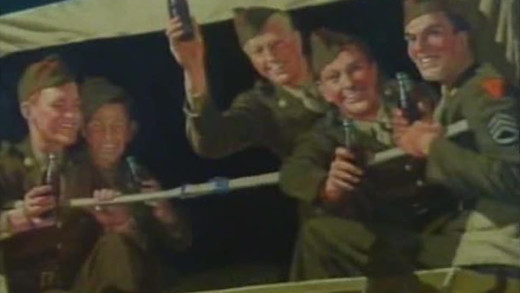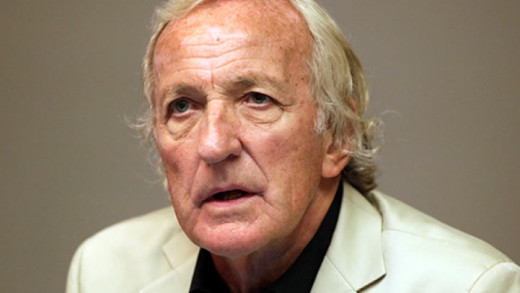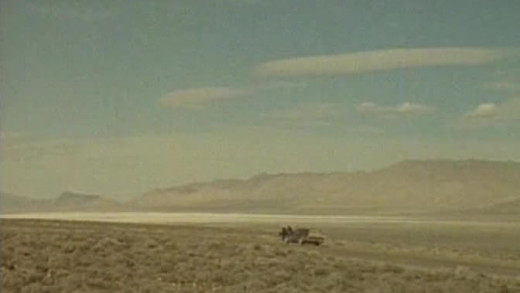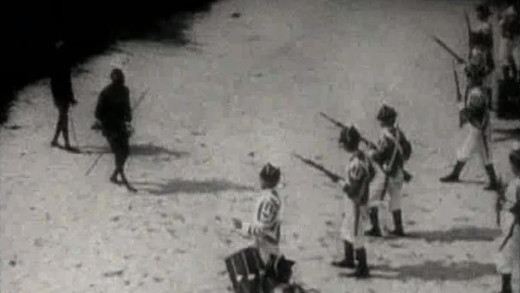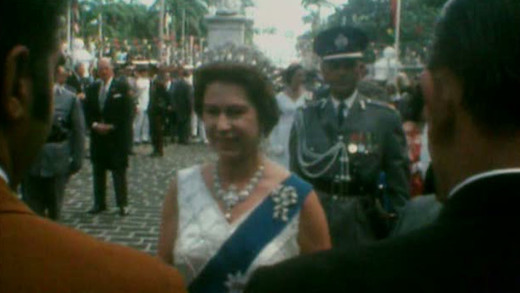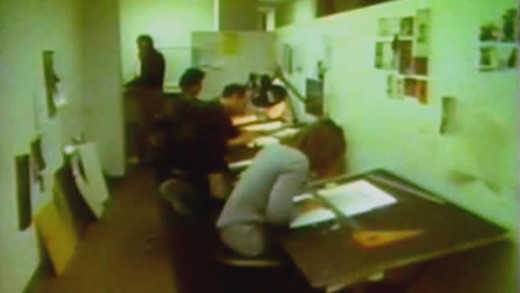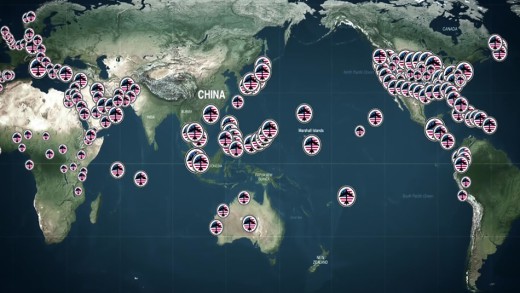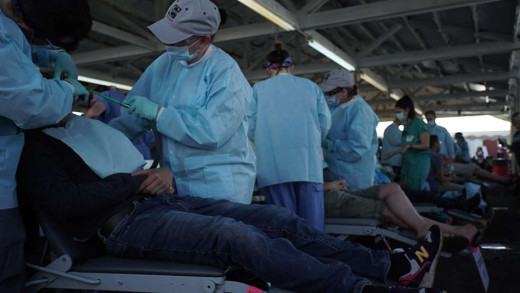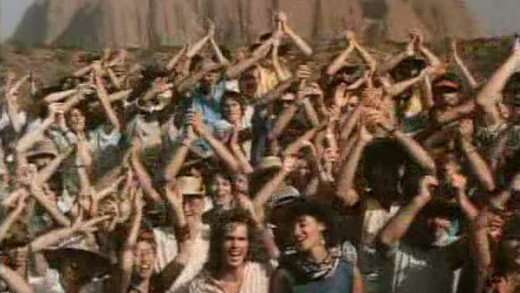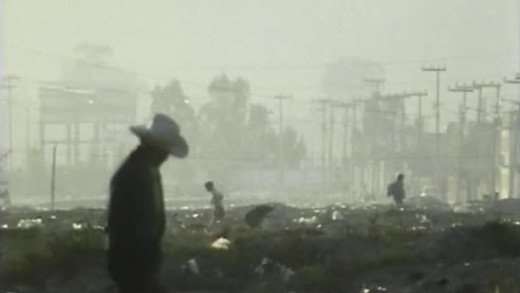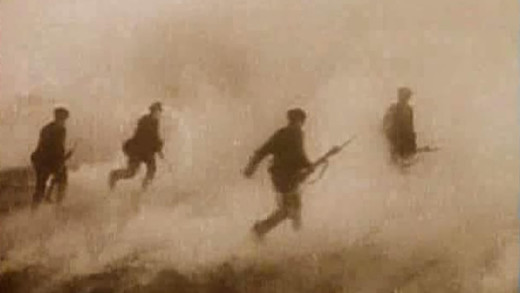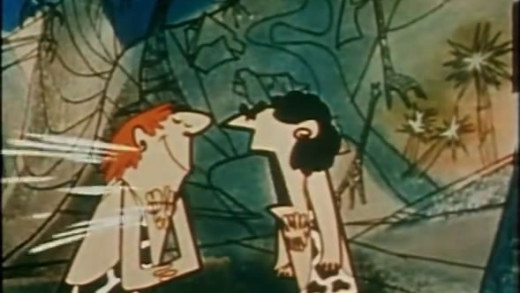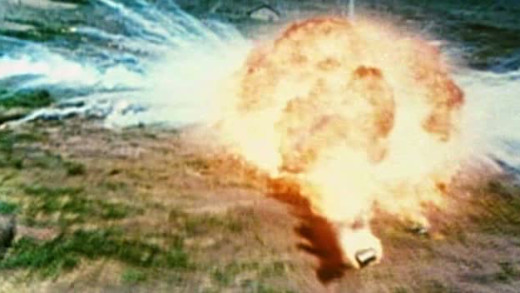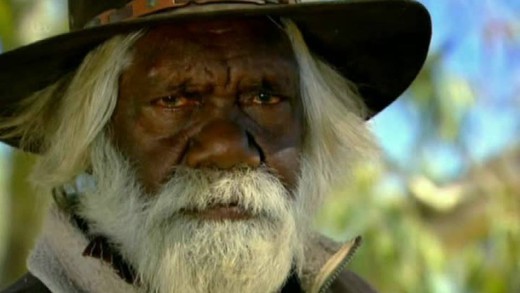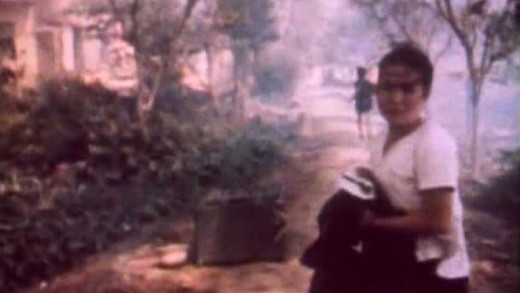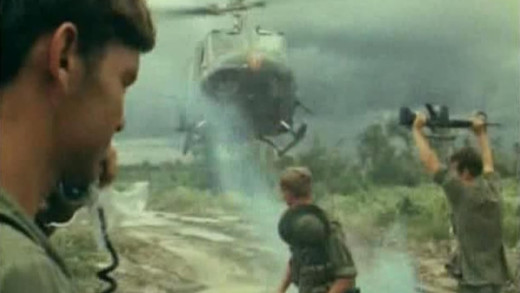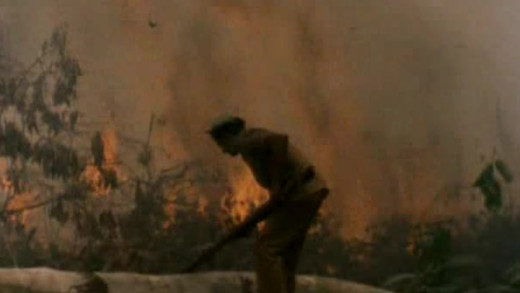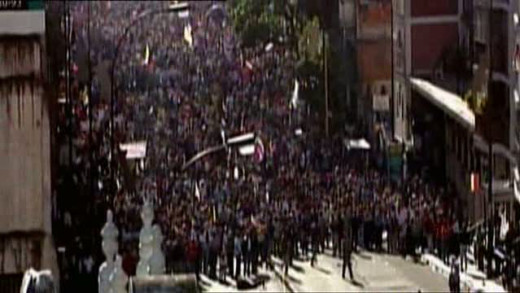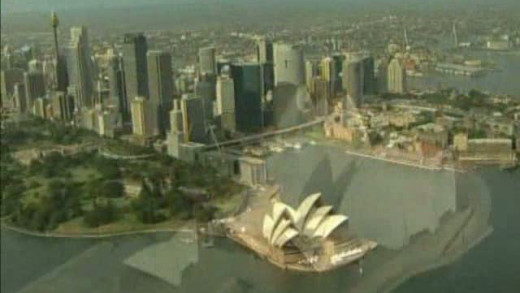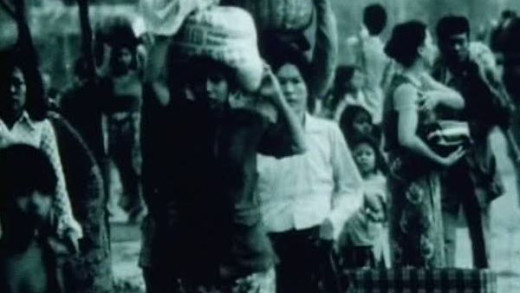After Iraq invaded Kuwait in 1990, the United Nations (backed strongly by the US and UK) imposed harsh sanctions on Iraq that lasted for 10 years (1991-2001); the harsh restrictions on imports of everything, including access to key medicines, resulted in over a million deaths, more than half a million of which were women and children. That's more deaths than the two atomic bombs dropped on Japan and the events of September 11 combined. The purpose was regime change, but it never came. The overwhelming majority of those killed were the poor, elderly, women and children. Empirically, sanctions overwhelmingly punish the poor, the destitute. While the sanctions were in place, the richest people in control of the resources (Saddam Hussein et al.) still had everything they wanted: food, cars, mansions, free access to medicines, etc...
Pepsi vs. Coke in The Ice Cold War traces the history of the worldwide struggle for soft drink supremacy by the Coca Cola Company, against the backdrop of World War II. The war was the perfect vehicle for Coca-Cola distribution, including to the Nazis. Bottling plants on front lines were paid for by the US war department. Nixon got Kremlin supremo, Khrushchev, to pose drinking Pepsi, which became the first US product made in the Soviet Union. In 1949, Mao kicked Coca-Cola out of China. President Carter got it back in 1978. In Chile, Pepsi Cola's boss ran a daily paper which was used by the CIA to help Pinochet's bloody coup...
Renowned independent journalist John Pilger speaks about complicity and compliance, censorship and citizen journalism as well as issues such as the holocaust in Iraq and Kevin Rudd's shrewd political apology to the Indigenous peoples of Australia as Prime Minister. "These days, a one-dimensional political culture ensures that few writers write, or speak out, as they did in the last century. They are talented, yet safe. In the media, the more people watch, the less people know. Beneath the smokescreen of objectivity and impartiality, media establishments too often ventriloquise the official line, falling silent at the sight of unpleasant truths."
John Pilger travels to Reno, Navada in the United States, to investigate the threats facing Pyramid Lake--a reservation of the Paiute people. With water diversion beginning in 1905 by Derby Dam and the lake's very existence threatened, the Paiute sue the conservation department of government--the DOI--to curtail further damage. By the mid 1970s, the lake had lost 80 feet of depth, with extensive impacts to fish and other life of the lake. Further water diversion in the 1970s was driven by a racially-exclusive sportsman's and leisure reserve used for white hunting and recreation near the town of Fallon...
The secret history of Australia is a historical conspiracy of silence. Written history has long applied selectivity to what it records, largely ignoring the shameful way that the Indigenous people were, and continue to be, treated...
In the 1960s and 70s, British governments conspiring with American officials, secretly tricked into leaving and then expelled, the entire population of the Chagos islands in the Indian Ocean as to make way for a major American military base. Indeed from Diego Garcia, American military planes have since bombed Afghanistan and Iraq. Stealing A Nation documents the story of the islanders who were dumped in the slums of Mauritius and in the words of the British officials who left a 'paper trail' of what the International Criminal Court now describes as 'a crime against humanity'...
Street of Joy
Street Of Joy looks at how product marketing methods and advertising techniques are applied to politics by specifically following the campaigns around the election of Jimmy Carter in the United States during 1976. In these times, the techniques of today are seen in their early years, especially the use of carefully crafted images for use on television...
Thalidomide: The Ninety-Eight We Forgot follows a four-year investigation on behalf of a group of children damaged at birth by the drug Thalidomide which was introduced in the late 1950s to treat morning sickness and to aid sleep. The drug caused birth deformities, such as phocomelia, with more than 10,000 children in 46 countries born with deformities. This film investigates why a group of people are excluded from compensation from the effects of Thalidomide by various legal proceedings—still relevant today in the context of how the legal system continues to protect corporations at the expense of life itself.
The Coming War on China is a warning that nuclear war is not only imaginable, but a 'contingency,' says the Pentagon. The greatest build-up of NATO military forces since the Second World War is under way on the western borders of Russia, and some 400 American military bases encircle China with missiles, bombers, warships and nuclear weapons. But these happenings are of course not reported as United States antagonism. Instead, there is a familiar drumbeat of war, the kind of the old "yellow peril," a restoration of the psychology of fear that embedded public consciousness for most of the 20th century. The aim of this film is to break the silence, and as the centenaries of the First World War presently remind us, horrific conflict can begin all too easily. By recounting the secret and forgotten history of the rapacious actions of great power against China throughout the decades, such as the destruction of the Marshall Islands and the Opium wars, The Coming War on China is also a report of an inspiring popular resistance to nuclear weapons, military bases and warmongering of the United States, of which little is known in the West.
Britain's National Health Service, the NHS, was the world's first universal public health service, created out of the ideal that healthcare should be available to everyone, regardless of wealth. Designed to give millions of people "freedom from fear" following the Second World War, the NHS today is under threat of being sold-off and converted to a free-market model, inspired by the private health insurance system in the United States, which results in the deaths of an estimated 45,000 people every year. President Trump says the NHS is "on the table" in any future trade deal with America. Filmed in Britain and the United States, this timely documentary reveals what may be the last battle to preserve the most fundamental human right: health. Veteran filmmaker John Pilger takes us through a history of threats to Britain's National Health Service, from its founding in 1948, through a push for privatisation during the 1980s, to challenges by the new politics of today and the drive for corporate take-over.
In these three films, John Pilger and Alan Lowery return to Australia to celebrate the country’s bicentenary, interviewing an extraordinary range of Australians from diverse backgrounds, each of whose views are a long way from those of the treasured Aussie stereotypes...
The Mexicans
The Mexicans reports on the history of political repression and corruption in Mexico, a country dominated to this day by its close neighbour—the United States.
The myths of globalisation have been incorporated into much of our everyday language. "Thinking globally" and "the global economy" are part of a jargon that assumes we are all part of one big global village, where national borders and national identities no longer matter. But what is globalisation? And where is this global village? In some respects you are already living in it. The clothes in your local store were probably stitched together in the factories of Asia. Much of the food in your local supermarket will have been grown in Africa...
The Search For Truth In Wartime investigates the changing face of war reporting and the role of the media during wartime, in context with the Crimea through the two World Wars, to Vietnam and the Falklands. "What is the role of the media in wartime? Is it simply to record, or is it to explain? And from whose point of view--the military, the politicians or the victims?"
When the United States devastated Hiroshima and Nagasaki with nuclear weapons in 1945, the bombs dropped were code-named 'Fat Man' and 'Little Boy' -- as part of the new propaganda campaign to create acceptable images of war, propagating the illusion that the world should live securely with nuclear weapons, and that it is the only way to 'enable peace'. By using reassuring and even soothing language, this new kind of propaganda spread all over the world...
The War You Don't See traces the history of 'embedded' and independent reporting from the carnage of World War One to the destruction of Hiroshima, and from the invasion of Vietnam to the current war in Afghanistan and disaster in Iraq. As weapons and propaganda become even more sophisticated, the nature of war is developing into an 'electronic battlefield' in which journalists play a key role, and civilians are the victims. But who is the real enemy?
To Know Us Is To Love Us covers the public reaction to a Vietnamese refugee camp constructed outside Fort Smith in Arkansas, 1975—not long after the end of the Vietnam war. The film documents the stories of the refugees coming to the United States, along with the reactions of American troops, the public and citizens who take in Vietnamese refugees to assimilate them into American life.
Utopia
Utopia is both an epic portrayal of the oldest continuous human culture on the planet--indigenous Australia--and an investigation into a suppressed colonial past and rapacious present. One of the world's best kept secrets is revealed against the great Australian 'mining boom,' showing how the country's racially divided past and current-day media collusion play their parts in a system that is apartheid in all but name. The film examines the exploitation of the Aboriginal population, both as a people and of the land they have lived on for centuries, and how so many institutions have profited while people continue to suffer. The injustice stretches across countless generations and stories. Utopia reveals this universal story of power and resistance, driven by old imperatives, in a media age of saturation which is profoundly silent and complicit; a call to continue resistance.
After the 1973 Paris Agreement and military ceasefire, more than 70,000 soldiers and civilians had been killed in Vietnam. Vietnam -- Still America's War investigates how the Vietnamese populace still have to contend with mines and other legacies of the war, even after the ceasefire, and after the war...
In 1975, John Pilger reported the end of the Vietnam War from the American Embassy in Saigon, where the last American troops fled from the roof-top helicopter pad. Twenty years later, he returns to Vietnam to revive the Vietnamese past and present from the plethora of fake Hollywood images which pity the invader, and overshadow one of the most epic struggles of the 20th century.
Using interviews and frontline footage, Vietnam -- The Quiet Mutiny reveals the internal sense of disillusionment and frustration born from the rift between bureaucracy and soldiers, that triggers the withdrawal of the United States military from Vietnam. As the US employs psychological warfare against the Vietnamese, reporter John Pilger finds himself unable to obtain meaningful information from the military—a press conference he attends is nicknamed "the 5 o'clock follies" for the evasive nature of the proceedings. And so it is with the grunts, the "wheels of the green machine," that Pilger finds a very human side to the US presence in Vietnam: soldiers who were once ready to serve their country, now doubtful of their purpose there. Plied with visits from Miss America and ignored by Vice President Spiro Agnew, they experience the war in a way many of their superiors do not.
War By Other Means examines the policy of western banks making loans to so-called 'third world' countries, which are then unable to meet the crippling interest charges—debt used as a weapon. The film primarily analyses 'Structural Adjustment Programs,' which are proclaimed to enable countries to compete in the 'global economy,' but have the opposite effect of lowering wages which in turn further transfers the wealth from the poor to the rich.
Set in Latin America and the US, War on Democracy explores the historic and current relationship of Washington with countries such as Venezuela, Bolivia and Chile. John Pilger examines the role of Washington in America's manipulation of Latin America during the last 50 years leading up to the struggle by ordinary people to free themselves from poverty and racism...
The 2000 Olympic Games in Sydney were universally recognised as an overwhelming success. The Australian heroine from start, when she carried the Olympic torch into the stadium, to finish, as she crossed the line to take 400m gold, was the indigenous athlete Cathy Freeman. Against the will of many of her still oppressed people, she came to represent the symbol, albeit shallow, of reconciliation between White Australia and Indigenous Australia. But the frenzy of flames and fireworks surrounding the Games blinded the rest of the world to the real history behind it all...
As the first complete report of the atrocities committed by the Khmer Rouge and the devastating affects of US bombing in Cambodia during the Vietnam War, Year Zero -- The Silent Death Of Cambodia is an important and historic document of the grim reign of Pol Pot and the world's response of indifference and inaction...
Founded in 1976, the United States Office of Multilateral Diplomacy--known informally as the Zap Office--was created by Henry Kissinger to try and influence the voting patterns of third world nations at the United Nations by withholding food aid to those who did not vote alongside the United States. Zap! The Weapon Is Food is an investigation of this policy, one that makes food more powerful than oil...

